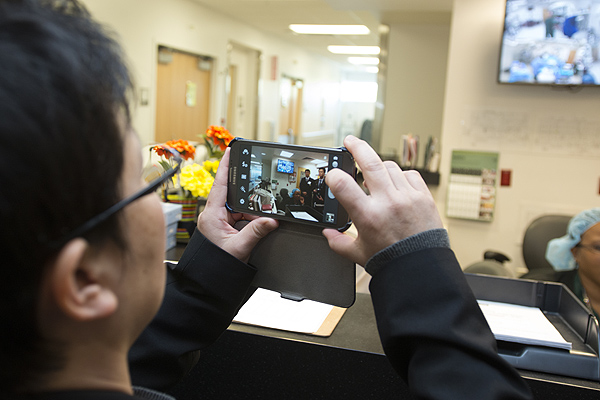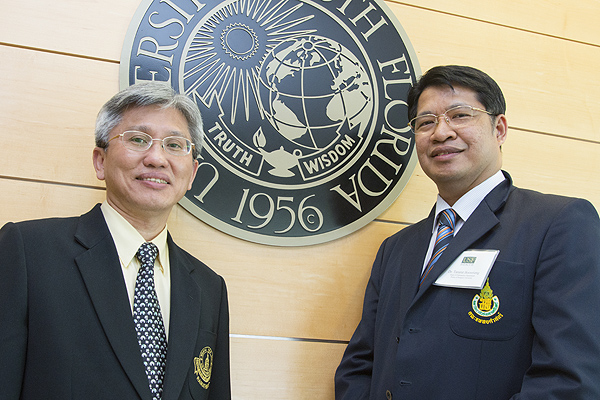http://www.youtube.com/watch?v=oimGvgOEXLQ
Few other events bring together USF’s emerging scientists better than the annual USF Health Research Day. The day-long event showcases the best and the brightest researchers across all USF Health colleges, as well as guest researchers whose work focus on the science of health. It also allows many of them to spotlight existing collaborations, as well as form new ones, said Phillip Marty, PhD, vice president for USF Health Research.
“These kinds of opportunities for multidisciplinary collaborations are the essence of what academic medicine is all about,” Dr. Marty said. “The best science comes from academic medical and academic health centers.”
This year’s event, the 23rd Annual USF Health Research Day, kept the promise for top research projects and a steady crowd of interested faculty, staff and students reinforced the fact that research is at the heart of USF Health.
A record 340 presenters participated in this year’s USF Health Research Day, an event that showcases the work of graduate and postgraduate students and residents, and even faculty and staff, from throughout USF Health, as well as across campus.
In addition to those from USF, 14 of the poster presenters were students from charter high and middle schools in The Villages, showcasing their own award-winning posters. This is the second year the young students’ posters were judged by USF post doc students. The mentoring effort formed out of a partnership between USF Health and the Villages. The young scientists seem to hold their own when various visitors inquired about their work and the charter students seemed to enjoy interacting with USF faculty, even having a group shot with USF Health CEO Stephen Klasko, MD, MBA, dean for the USF Health Morsani College of Medicine.
The event began bright and early, starting off with the 4th Annual Annual Joseph Krzanowski, PhD, USF Health Invited Oral Presentations Session, when only a select few researchers present their work. The 10 invited to present their work orally this year were: Juanjuan Yin, Ingrid Ramirez, Ravi Kasiappan, Lee Stratton, Tigran Kesayan, JungA Alexa Woo, Nadine Nelson, Shabnam Mehra, Evelyn Anegbe, Andrea Bingham and Jessica Gordon.
Immediately following the oral presentations, the full poster presentation session began. Judges made their rounds to each presentation, asking the lead researchers to further explain their methods, results and conclusions before deciding on the award-worthy entrants. Many of the budding researchers use the day-long event as a prime opportunity for collaboration and as a “practice run” for future national research meetings.
Culminating the day was the Roy H. Behnke Distinguished Lectureship, featuring Howard McLeod, PharmD, professor of pharmacogenomics and director of the Institute for Pharmacogenomics and Individualized Therapy at the University of North Carolina at Chapel Hill. His talk was titled “Using the Genome to Guide Therapy.” (See related story)
As the day wound down, winners were announced at the Awards Ceremony: Best MCOM Graduate Student Poster Presentations: – Allergy and Immunology: Chris Laird – Allergy and Immunology: Amorce Lima – Cancer Biology: Nadine Nelson – Cardiovascular: Justin Hooper – Clinical Science and Outcomes Research: Ty Bowman – Molecular and Cell Biology: Shannon Kesl
Best MCOM Medical Student Presentations:
- Med II Student Poster Presentation, Allergy and Immunology: Daniel Olson
- Med II Student Poster Presentation: Cancer Biology: Shonali Midha
- Med II Student Poster Presentation, Chart Reviews and Case Studies: John Pham
- Med II Student Poster Presentation, Clinical Sciences: Yin Zheng
- Med II Student Poster Presentation, Education: Candace Haddock
- Med II Student Poster Presentation: Stephen Aradi – Med III Student Poster Presentation, Chart Reviews and Case Studies: Gregory Horn
Best Undergraduate Student Poster Presentations:
Clinical: Annie Castillo
Molecular and Cell Biology: Peter Moran
Neuroscience I: Beatrice Attilus
Neuroscience II: Awa Sanneh
Best College of Pharmacy Poster Presentations:
- Graduate Student: Athar Naif
- Postdoctoral: Chapalamadugu Kalyan
Best College of Public Health Poster Presentations:
- Graduate Student: Margeaux Chavez
- Graduate Student: Korede Adegoke
- Graduate Student: Pamela Guevara
- Graduate Student: Jennifer Sedillo
- Graduate Student: Blake Barrett
- Graduate Student: Christopher Campbell
- Graduate Student: MahmoodaKhaliq Pasha
Best TVCS High School Student Poster Presentation: Kathryn Fairchild
Best TVCS Middle School Student Poster Presentation: Kunal Upadya
***
USF Health Vice President’s Award for Outstanding Graduate Student Oral Presentation: Andrea Bingham
MCOM Outstanding Postdoctoral Poster Presentation: Ravi Pathak
MCOM Outstanding Postdoctoral Poster Presentation: Jessica Chang
MCOM Best Resident Poster Presentation: Jiangchuan Tao
MCOM Best Resident Poster Presentation: Midhir Patel
Watson Clinic Award to a Fourth-Year Medical Student: Chad Engel
Dr. Christopher P. Phelps Memorial Fund Annual Morsani COM Graduate Student Travel Award: Laura Blair
Pediatric Administrators Awards for Best Presentation on Children’s Health: Sarah Maness
***
Video by Allyn DiVito, USF Health Information Services
Social Media by Elizabeth Peacock, USF Health Communications
Story by Sarah A. Worth, USF Health Communications
Photos by Eric Younghans, USF Health Communications
RELATED STORIES:
Research Day 2013: Bringing USF Health together
Research Day speaker: Move genetic discovery to medical practice












































 “Everybody has said that – ‘You’ll change your mind,’ ‘’ he said. “But this is what I love.”
“Everybody has said that – ‘You’ll change your mind,’ ‘’ he said. “But this is what I love.” Her dedication has paid off in stellar grades. Now Pepper, 25, plans to match in internal medicine; she hopes eventually to do a fellowship in allergy and immunology.
Her dedication has paid off in stellar grades. Now Pepper, 25, plans to match in internal medicine; she hopes eventually to do a fellowship in allergy and immunology. “I’m just really, really excited for all of us,” Wang says. “We’ve been waiting for several months and it’s great to have that burden lifted off our shoulders.”
“I’m just really, really excited for all of us,” Wang says. “We’ve been waiting for several months and it’s great to have that burden lifted off our shoulders.” Goldonowicz poses for a picture with her mother, Janice, and her little sister, Joanna. Her mother talks about Jessica’s father, and how proud he would be today.
Goldonowicz poses for a picture with her mother, Janice, and her little sister, Joanna. Her mother talks about Jessica’s father, and how proud he would be today.










